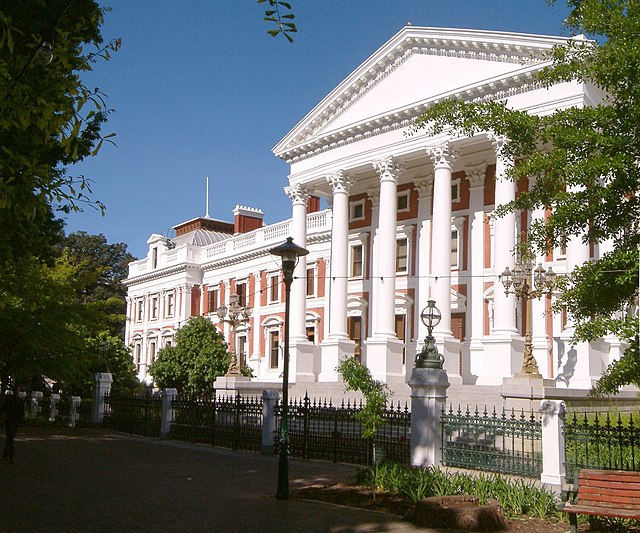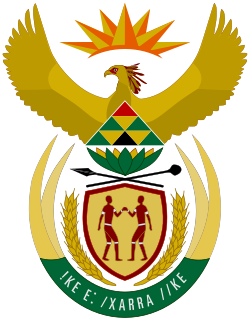Top Qs
Timeline
Chat
Perspective
Government of South Africa
From Wikipedia, the free encyclopedia
Remove ads
The Government of South Africa, or South African Government, is the national government of the Republic of South Africa, a parliamentary republic with a three-tier system of government and an independent judiciary, operating in a parliamentary system. Legislative authority is held by the Parliament of South Africa. Executive authority is vested in the President of South Africa who is head of state and head of government, and their Cabinet. The President is elected by the Parliament to serve a fixed term.
South Africa's government differs from those of other Commonwealth nations. The national, provincial and local levels of government all have legislative and executive authority in their own spheres, and are defined in the South African Constitution as "distinctive, interdependent and interrelated".
Operating at both national and provincial levels ("domes") are advisory bodies drawn from South Africa's traditional leaders. It is a stated intention in the Constitution that the country be run on a system of cooperative governance.
The national government is composed of three inter-connected branches; the legislature (parliament, consisting of the National Assembly and the National Council of Provinces), the executive (the President, who is both Head of State and Head of Government), and the judiciary (the Constitutional Court, the Supreme Court of Appeal, and the High Court).
All bodies of the South African Government are subject to the rule of the Constitution, which is the supreme law in South Africa.
Remove ads
Legislative

The Parliament of the Republic of South Africa is South Africa's legislature. It is located in Cape Town; the country's legislative capital.
Under the present Constitution of South Africa, the bicameral Parliament comprises a National Assembly and a National Council of Provinces.[2][3][4] The current twenty-eighth Parliament was first convened on 14 June 2024.
From 1910 to 1994, members of Parliament were elected chiefly by the South African white minority. The first elections with universal suffrage were held in 1994.
Both chambers held their meetings in the Houses of Parliament, Cape Town that were built 1875–1884. A fire broke out within the buildings in early January 2022, destroying the session room of the National Assembly. It was decided that the National Assembly would temporarily meet at the Good Hope Chamber.[5]Remove ads
Executive


The President, Deputy President and the Ministers of the South African Government make up the executive branch of the national government. Ministers are Members of Parliament who are appointed by the President to head the various departments of the national government. The president is elected by parliament from its members.
Remove ads
Judicial
The third branch of the national government is an independent judiciary. The judicial branch interprets the laws, using as a basis the laws as enacted and explanatory statements made in the Legislature during the enactment. The legal system is based on Roman-Dutch law and English common law and accepts compulsory ICJ jurisdiction, with reservations. The constitution's bill of rights provides for due process including the right to a fair, public trial within a reasonable time.
- Magistrates' Courts – The court where civil cases involving less than R100 000, cases.
Provincial government
Summarize
Perspective
The nine provinces of South Africa are governed by provincial governments which form the second layer of government, between the national government and the municipalities. The provincial governments are established, and their structure defined, by Chapter Six of the Constitution of South Africa.
The provincial governments are structured according to a parliamentary system in which the executive is dependent on and accountable to the legislature. In each province the provincial legislature is directly elected by proportional representation, and the legislature in turn elects one of its members as Premier to head the executive. The Premier appoints an Executive Council (a cabinet), consisting of members of the legislature, to administer the various departments of the provincial administration.
The powers of the provincial governments are circumscribed by the national constitution, which limits them to certain listed "functional areas". In some areas the provincial governments' powers are concurrent with those of the national government, while in other areas the provincial governments have exclusive powers. The constitution prescribes a principle of "co-operative government" whereby the various layers of government must co-ordinate their actions and legislation; it also lays down a series of rules for resolving conflicts between national and provincial legislation.Remove ads
Local government
Local government in South Africa consists of municipalities of various types. The largest metropolitan areas are governed by metropolitan municipalities, while the rest of the country[6] is divided into district municipalities, each of which consists of several local municipalities. After the municipal election of 18 May 2011 there were eight metropolitan municipalities, 44 district municipalities and 226 local municipalities.[7]
Municipalities are governed by municipal councils which are elected every five years. The councils of metropolitan and local municipalities are elected by a system of mixed-member proportional representation, while the councils of district municipalities are partly elected by proportional representation and partly appointed by the councils of the constituent local municipalities.[8]
Remove ads
Opposition
In each legislative body, the party or coalition of parties holding a majority of seats forms the government. The largest party not in the government is recognised as the official opposition.
References
External links
Wikiwand - on
Seamless Wikipedia browsing. On steroids.
Remove ads

